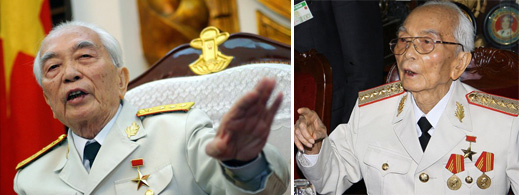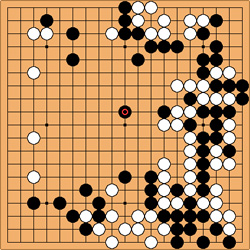
By John Helmer, Moscow
General Vo Nguyen Giap has died in Hanoi, aged 102.
There has been no general of his quality and achievement in modern times. He defeated the French and the Americans, and in two separate wars drove them as decisively out of Vietnam as Kutuzov drove Napoleon out of Russia. Giap, his army and people withstood more conventional bomb weight than was dropped on Germany, Italy and Japan, combined, during World War II. They survived the most massive chemical warfare campaign ever inflicted on earth – that’s the American one. They emerged victors from explosive force “100 times the combined impact of the Hiroshima and Nagasaki atomic bombs.”
For the demonstration that intelligence and daring can outwit firepower, and the small can fell the mighty, there has been none to match Giap’s prowess since Alexander the Great.
It is a pity for American people that Giap’s lessons have not been learned; and that US generals keep trying to make their reputations against under-gunned adversaries, deploying robots in place of soldiers, vengeance in place of strategy; until they too are defeated by men whose quality, compared with Giap’s, is much inferior.
Giap not only defeated generals. He cracked the US Army’s will, and at the infantry platoon level its command-and-control systems. GIs inculcated to believe they could outgun the Vietnamese by at least five to one, attributed their failure in the field to the superior firepower of the Vietnamese. They imagined they heard phantom helicopters in the air above them, or heavy tanks rolling through the jungle towards their positions. Giap himself has described fostering this with wooden cutouts.
John Kerry was a wooden cutout of another kind. He launched the political career that has reached its apogee as US Secretary of State with dubious claims to combat skill on Mekong Delta Swift Boats. He hijacked the reputation of Vietnam Veterans Against the War, a non-commissioned soldier’s movement, for himself.
 Harvard University did its academic best to defeat Giap, when professor Louis Fieser, inventor of napalm, and Henry Kissinger, professor of international affairs, both failed. Harvard’s secret weapon was a reputed prodigy named Scott Boorman. He was awarded the university’s highest fellowship for a study of how to beat Giap. Boorman’s idea was to teach American officers the tactics and strategy of the board game known as wei-chi in Chinese, go in Japanese, cờ vây in Vietnamese. Boorman too was defeated – he went off to teach at Pennsylvania, then Yale.
Harvard University did its academic best to defeat Giap, when professor Louis Fieser, inventor of napalm, and Henry Kissinger, professor of international affairs, both failed. Harvard’s secret weapon was a reputed prodigy named Scott Boorman. He was awarded the university’s highest fellowship for a study of how to beat Giap. Boorman’s idea was to teach American officers the tactics and strategy of the board game known as wei-chi in Chinese, go in Japanese, cờ vây in Vietnamese. Boorman too was defeated – he went off to teach at Pennsylvania, then Yale.
Since Giap’s death was announced on Saturday, amid news reports translated from the international media, not a single Russian veteran of the war years, nor a serving or retired Russian general officer, nor a current Russian government or military official has issued a statement on Giap.
Yevgeny Glazunov, an expert on Russian-Vietnamese relations in Moscow, said the silence is surprising. “Many of the Russian colleagues of Giap, those who met him, cooperated and worked with him, have already gone to another world. Today there remain ones who aren’t able, as they say, to give voice as they should. In particular, one of my friends, a general who worked with Giap, is now lying in hospital. This aspect of the issue is not surprising. But it is surprising that our military leadership today does not notice. Objectively in our country, and abroad, Vo Nguyen Giap is recognized as one of the foremost scholars and practicioners of armed war. Our experts at the General Staff Academy have written theses and many analyses on his work. But [today’s] silence does surprise me. I imagine the confusion of the Vietnamese, in the Vietnamese Embassy here, and in Hanoi – because the French side is making comments; even in the US there are substantial comments on the death of Giap. And for us, it is as if it did not happen.”











Leave a Reply